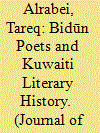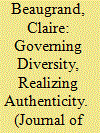| Srl | Item |
| 1 |
ID:
164397


|
|
|
|
|
| Summary/Abstract |
This article examines the ways in which Bidūn (stateless) poets negotiate and contest their placement within dominant narratives of national literary history in Kuwait. The article offers an analytical overview of the dominant modalities in which national literary history in Kuwait has been conceived as it relates to questions of national beginnings, periodization and the placement of stateless poets. Read against the existing modalities, the article analyzes the Bidūn poet Saʿdiyya Mufarriḥ’s The Cameleers of Clouds and Estrangement (2007) as a revisionist account of national literary history that opposes the exclusion of Bidūn writers. This is achieved by an emphasis on the inclusivity of literary and cultural affiliation over the exclusivity of limiting notions of official national belonging. A critical analysis of the arena of national literary history writing in Kuwait aims to offer a novel perspective on how notions of national belonging are being renegotiated from the margins.
|
|
|
|
|
|
|
|
|
|
|
|
|
|
|
|
| 2 |
ID:
190343


|
|
|
|
|
| Summary/Abstract |
Most of the Gulf states where foreigners make up the majority of the population value positively the diversity of their societies. Bahrain, Qatar and the United Arab Emirates publicly celebrate this diversity as a new form of cosmopolitanism. However, in Kuwait the official narrative, shaped partially by public figures’ statements in the Parliament, represents the country’s demographic composition and the presence of a wide diversity of foreign communities as impeding its social harmony and economic prosperity. This article builds on Michael Herb’s work on identifying the source of the Kuwaiti idiosyncrasy in the system of political participation that gives nationals voice and precedence, and seeks to understand Kuwait’s peculiar discursive governance of diversity. It contends that the official Kuwaiti understanding of authenticity has led to a political culture that emphasizes exclusiveness and cultural nationalism. In the UAE and other countries, on the contrary, this authenticity is staged and endowed with self-Orientalizing overtones so that it works, in the official discourse, as a pre-condition for a new kind of consumerist universalism based on cultural pluralism. The article first presents the different discursive approaches to diversity in the four Gulf states with a majority of foreigners. It then compares Kuwait and the UAE, examining how the Kuwaiti political system enabled the issue of naturalisations –– embodied by the handling of the bidūn files –– to be constructed as a public issue, and posits that this played a significant role in Kuwait’s tenacious emphasis on exclusion and authenticity.
|
|
|
|
|
|
|
|
|
|
|
|
|
|
|
|